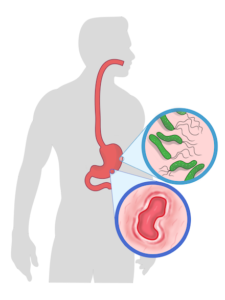Helicobacter Pylori

For years, doctors thought that eating spicy foods, smoking or stress caused stomach ulcers. Scientists then discovered that bacteria called Helicobacter pylori, known as H. Pylori, are responsible for most peptic ulcers. It is estimated that more than half of the population has H. pylori bacteria in their bodies, but most are unaware, as it doesn’t cause sickness for everyone.
While H. pylori is the most common cause of ulcers, not all patients with ulcers have H. pylori. Use of NSAIDs like ibuprofen, naproxen and aspirin are also known to cause peptic ulcers. The risk of ulcer disease and complications are further increased when H. pylori is present and NSAID use occurs.
Symptoms
You may not have any symptoms of H. pylori. Early signs indicating that you may have ulcer caused by H. pylori are:
- Dull or burning pain in stomach
- Heartburn
- Bloating
- Belching
- Nausea or vomiting
- Loss of appetite
Additionally, ulcers can cause bleeding in your stomach or intestines. You should call your doctor immediately if you experience:
- Stool containing blood, or is red or black
- Vomit containing blood
- Severe stomach pain
- Trouble breathing
- Dizziness
Causes
It is not really known exactly how H. pylori spreads. It is presumed that it may be transmitted by:
- Saliva; hand to mouth or mouth to mouth
- Fecal contamination to mouth; likely from not thoroughly washing hands after using the bathroom
We know that children are more at risk, likely because of lack of proper hygiene. There is also increased risk in developing countries.
Diagnosis
Your doctor can diagnose H. pylori by:
- Taking a medical history
- Performing a physical exam
- Performing diagnostic tests, such as a blood test, stool test, urea breath test or an endoscopy.
Treatment
If you have ulcers as a result of H. pylori, you’ll likely be prescribed a mix of medications that include:
- Antibiotics
- Proton Pump Inhibitors
- H-2 blockers
- Bismuth subsalicylate (Pepto Bismol)
Complications
If H. pylori causes an ulcer and the ulcer is left untreated, patients are at risk for:
- Internal bleeding
- Obstructions
- Perforation
- Stomach cancer
If you suspect you have H. pylori, our office can help. Call (706) 868-0104 for more information.
The content on our website is for informational purposes only, and is not intended to diagnose or treat any medical conditions. Always seek the advice of your physician with any questions you may have regarding your health.
